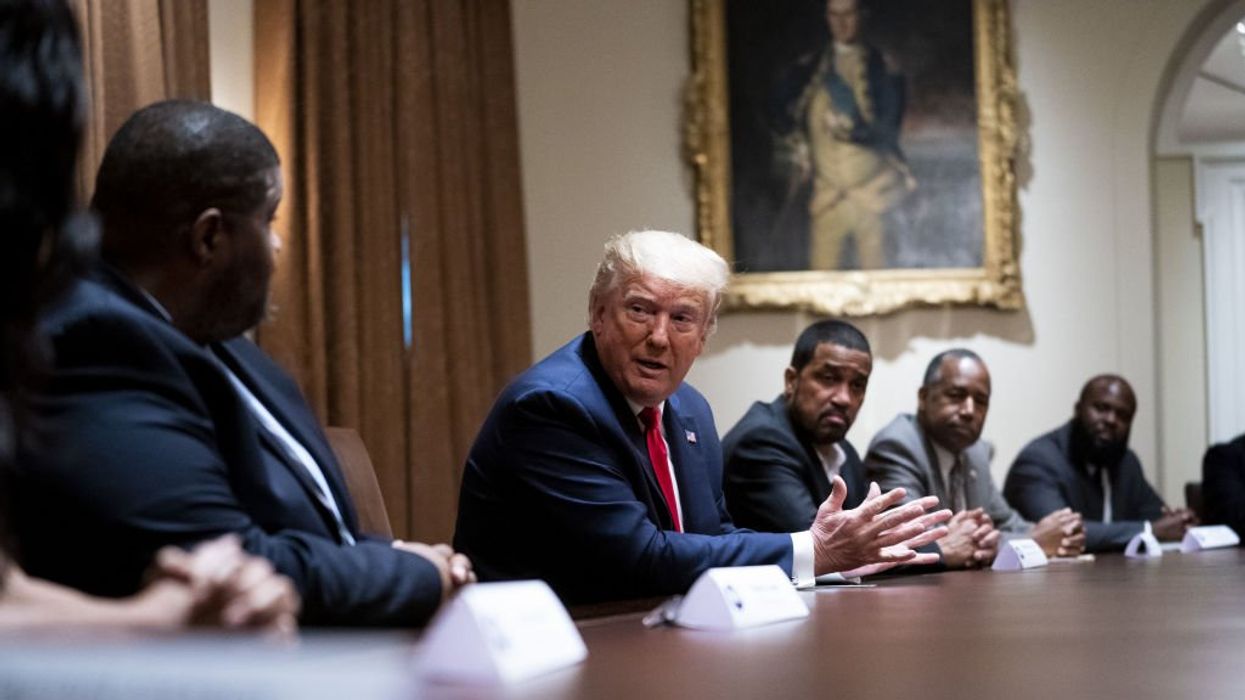
Photographer: Doug Mills/The New York Times/Bloomberg/Getty Images

Professor claims Trump has attempted to make inroads with black men through a 'racially problematic kinship narrative.'
Editor's note: The column appears to have been removed from the Forbes website. Blaze News has reached out to Forbes for comment.
A man who makes a living peddling systemic racism through DEI initiatives has now penned an article expressing concern that black men might be drawn to former President Donald Trump because he survived an attack with a gun.
Early Sunday morning, about 14 hours after the deadly shooting that nearly cost Trump his life, Forbes published a column about the shooting written by Shaun Harper, a USC business and education professor and self-described "diversity, equity and inclusion (DEI) expert."
'Will Trump seize the apparent assassination attempt against him as an opportunity to meaningfully address the epidemic of gun violence in America?'
In the column — entitled "Will Surviving Gunfire Be Donald Trump’s Next Appeal To Black Voters?" — Harper seemingly waxes indignant that Trump has attempted to reach out to the black community, black men in particular, because of their shared experiences with the criminal justice system.
"The presumptive Republican presidential nominee has repeatedly contended that the August 2023 release of his criminal mugshot deeply resonated with Black voters because they know firsthand the unfairness of our nation’s criminal justice system," wrote Harper.
Even as he admits that "more Black men now than four years ago say they’re voting for Trump" in 2024, Harper still does not believe Trump's outreach to black men has been effective since black men who claim they will vote for Trump in November do not cite "shared kinship with judicial injustice" as the reason for their electoral support.
In fact, Harper takes issue with Trump attempting to associate himself at all with the black experience, accusing Trump of inventing a "racially problematic kinship narrative" to force the connection. "Hopefully, being shot doesn’t become a similarly problematic strategy to link Trump with an experience that far too many (not all) Black people have," the tenured USC professor added awkwardly.
In the column, Harper also tacitly warned Trump not to co-opt supposedly iconic black images for his political benefit. One such image is the raised fist, a gesture that Trump makes regularly, including in the immediate aftermath of the shooting.
After he was shot in the ear on Saturday evening, Trump stood before his crowd of supporters, blood dripping down his face, with his fist raised in the air. "Fight! Fight! Fight!" he urged them.
Harper noted the similarity between Trump's impromptu, perhaps habitual, raised fist and the pre-planned "Black Power Salute" from U.S. track athletes Tommie Smith and John Carlos while on the winners' podium at the 1968 Summer Olympics. "Hopefully Trump doesn’t claim that his raised fist was an homage to Smith and Carlos, two powerful Black Americans," Harper said.
Harper also worries that Trump may use his raised-fist moment to stand in solidarity with the 2020 protesters after the death of George Floyd. Any such connection between Trump and the 2020 protesters would be "erroneous" and disingenuous, Harper insisted.
Rather than turn this attempted assassination into an opportunity to secure more votes, Harper hinted that Trump should use this moment to advocate for gun control, noting the alarming rates at which black men die from gun violence without also noting that black men are almost always the ones pulling the trigger in such cases.
"Will Trump seize the apparent assassination attempt against him as an opportunity to meaningfully address the epidemic of gun violence in America? Will he deem unacceptable the dangers to which citizens are exposed as they go to schools, places of religious worship, concerts, movie theaters, supermarkets, shopping malls, sporting events, and now, presidential campaign rallies? It’s possible, but unlikely," Harper said.
Harper also recently criticized Trump's reference to "black jobs" at the infamous debate with Joe Biden last month. Harper described the term as "offensive," even as he acknowledged that low-skilled, labor-intensive jobs such as "hotel housekeeping" and "airport baggage handling" are disproportionately filled by black people.
Like Blaze News? Bypass the censors, sign up for our newsletters, and get stories like this direct to your inbox. Sign up here!